From an Austrian perspective, the notion of price gouging does not exist – the gasoline is the gas station owner’s property and he/she is under no obligation to sell it for any particular price, nor am I, as a consumer, obligated to buy... Even among those who agree in principle with market based pricing, the price gouging mentality has gained a foothold – even conservative radio talk show hosts have caught the disease.
The concept most people, seem to have most difficulty with is the replacement cost argument – the refinery or gas station bases it prices on what it expects to pay for its next delivery and not to recoup the cost of the last one. People understand that nobody will sell them 1000 shares of Google for 10% above last January’s price, or a Pacific Heights apartment for 20% above its 2000 price, and consider that this is perfectly reasonable.
Yet the same people expect a gas station owner, who paid $2.50 a gallon for the gas now selling at the pumps, to be morally bound (and in some states legally bound) to sell it for a “fair price”, $2.58 a gallon, even though the cost of the next shipment from the refinery will be $2.75 a gallon.
Monday, November 28, 2005
price gouging 101
While reading the Mises blog, I came across an excellent, although unsigned blog post, which tersely and yet effectively defuses the cries of "there ought to be a law"-types who think that coercion is the answer to everything, without realizing that coercion is usually the source of the problems to begin with. The one caveat I would attach is that the first argument is an ethical argument based on the premise of private property rights, and not based upon Austrian economics, but rather a libertarian philosophical grounding.
Sunday, November 27, 2005
propaganda redux
If you hadn't had enough dyspepsia last time; here have some more:
Let's see what we've got here--
Gross caricatures depicting the enemy as subhuman and implicating Americans who ignore wartime edicts as their cohorts...

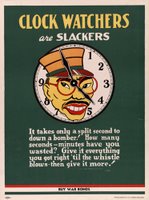



Equating downtime for recovery or leisure with active support of an enemy...



Denigration of those who choose to engage in peaceful, mutually-beneficial exchange as selfish, greedy, unjust lowlifes who help the enemy...
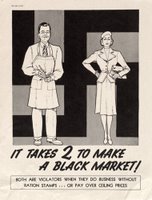
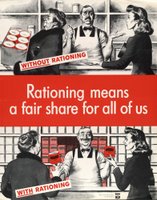
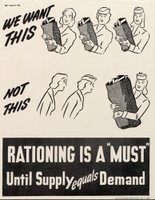
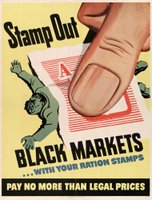

Discouraging people from maximizing their psychic value, by placing the needs of the war above the desires of individuals as indicated by their market preferences...






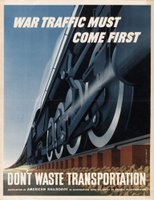
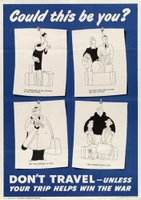
Silly, Norman-Rockwell Americans promoting a variety of harmful and inefficient government schemes...
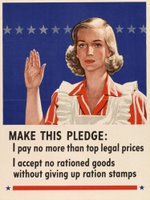





Slavery is freedom, free speech is dangerous, non-supporters of the authoritorian regime are going to have a german-speaking group of authoritarians take their place as if it makes a difference...



Let's see what we've got here--
Gross caricatures depicting the enemy as subhuman and implicating Americans who ignore wartime edicts as their cohorts...





Check!
Equating downtime for recovery or leisure with active support of an enemy...



Check!
Denigration of those who choose to engage in peaceful, mutually-beneficial exchange as selfish, greedy, unjust lowlifes who help the enemy...





Check!
Discouraging people from maximizing their psychic value, by placing the needs of the war above the desires of individuals as indicated by their market preferences...








Check!
Silly, Norman-Rockwell Americans promoting a variety of harmful and inefficient government schemes...






Check!
Slavery is freedom, free speech is dangerous, non-supporters of the authoritorian regime are going to have a german-speaking group of authoritarians take their place as if it makes a difference...



Check!
Wednesday, November 23, 2005
just a friendly reminder

To those of you out there for which the following is true-- you clap at the movie theatre. Although it may not be apparent, I regret to inform you that the actors who appear on your local cinema screen cannot see or hear you. So why the hell is there a signifigant number of you audience members clapping when you see the trailer for Star Wars or some other popular film? Would you do the same thing at home in front of your TV?
Tonight I had the pleasure of seeing the latest Harry Potter film at the Lowes Imax theatre on 68th and Broadway with my darling wife. When the Warner Brothers logo intro'd the film, nearly the entire audience roared with applause. Same thing when the film ended.
What for? I can understand people getting excited, but it's not like there is a receiving party at the other end which can enjoy approval and being appreciated for their effort.
Sports, shows, musicals, comedians, concerts, speeches and other live entertainment are all suitable venues for audience members to display their approval. I'm ambivalent regarding applause upon plane landings, though I can understand it since there are other representitives of the airline, such as the stewardesses, who can be the 'recipients' of the approval for the pilots landing skills.
So stop clapping at the movie theatre already!
Monday, November 21, 2005
cafe hayek on the FDA
Continuing upon their 'abolish the FDA' theme, Cafe Hayek posts Bob Higgs' response to one of the earlier posts:
My favorite bit:
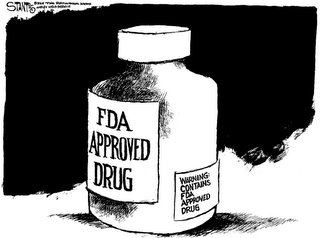
My favorite bit:
"The FDA is one of the greatest frauds ever perpetrated on the American people. It is a police agency, pure and simple, driven entirely by political motives, yet it constantly harps on, and gains public-relations mileage from, its scientific grounding. We need to keep telling as many people as we can get to listen that the FDA does not do what it claims to do."

Friday, November 18, 2005
complacency kills
I always stress this meme when explaining the unintended consequences of the even most benign-sounding legistlation. As Lisa Casanova said it some time ago on Catallarchy.net:
The idea behind it was to remove all the safety devices that drivers have come to take for granted and have lulled them into complacency; road stripes, speed signs, demarcated curbs, traffic lights, etc. This reintroduces the drivers to the reality of what their vehicle is truly capable of if mishandled. Drivers tend to drive slower and keep mindful of pedestrians who are walking just a few feet away and whom no longer enjoy the illusion of safety of an elevated curb. The removal of the road stripes makes drivers drive closer to the side than center of the road, because road stripes subconsciously allow them to drive "in their lane" instead of driving safer and closer to the side. The same goes for speed signs -- take them away and the drivers will gauge the risk of high-speed driving, instead of relying on road signs to give them a roundabout figure of the safety margin.
It even seems to encourage greater road cooperation:
If there ever was a great argument for anarchy, this is it.
The FDA should be totally shelved. No one should be in charge of keeping “marginally safe” drugs off the market, since there is really no such thing. There are no safe or unsafe drugs, only the tradeoff of risks and benefits that is unique to each individual making the choice to take the drug.There was also an article in Wired magazine, back in December 2004 which promoted the similar concept of road anarchy, in which 'The approach is radically counterintuitive: Build roads that seem dangerous, and they'll be safer.'
In a way, I think that abolishing the FDA might make big lawsuits less of a problem. Right now, people have this idea that drug safety is something they don’t need to concern themselves with, because someone else worries about it for them. They think someone is going to magically know alll the risks and benefits of a drug and tell them, “you can take this drug with zero worries. It’s nice and safe. Go ahead and pop that pill!”
Consumers of drugs get the idea that if the drug is on the market, that must be a sign that nothing bad can happen to them if they take it. If something bad does happen, someone must be to blame, since it was the job of somebody else to make sure the drug was safe, and nothing bad should happen to you if you take approved drugs, right?
Right now, people who take drugs that turn out to have serious risks have this attitude that someone let them down by not making sure that the drug they freely chose to take had no risks. Maybe people buying drugs on the market need to adopt more of a mindset of participants in a clinical trial, one of “I’m stepping into the unknown here. Is it worth it to me?”
If people knew that every time they take ANY drug, they are taking a risk (which is the way things really are), then maybe people would give lots more thought to drug safety than they do now, and outside of cases of companies committing fraud or hiding information about risks, it would be harder to blame someone else every time a drug turns out to have ill effects.
The idea behind it was to remove all the safety devices that drivers have come to take for granted and have lulled them into complacency; road stripes, speed signs, demarcated curbs, traffic lights, etc. This reintroduces the drivers to the reality of what their vehicle is truly capable of if mishandled. Drivers tend to drive slower and keep mindful of pedestrians who are walking just a few feet away and whom no longer enjoy the illusion of safety of an elevated curb. The removal of the road stripes makes drivers drive closer to the side than center of the road, because road stripes subconsciously allow them to drive "in their lane" instead of driving safer and closer to the side. The same goes for speed signs -- take them away and the drivers will gauge the risk of high-speed driving, instead of relying on road signs to give them a roundabout figure of the safety margin.
It even seems to encourage greater road cooperation:
Monderman and I stand in silence by the side of the road a few minutes, watching the stream of motorists, cyclists, and pedestrians make their way through the circle, a giant concrete mixing bowl of transport. Somehow it all works. The drivers slow to gauge the intentions of crossing bicyclists and walkers. Negotiations over right-of-way are made through fleeting eye contact. Remarkably, traffic moves smoothly around the circle with hardly a brake screeching, horn honking, or obscene gesture. "I love it!" Monderman says at last. "Pedestrians and cyclists used to avoid this place, but now, as you see, the cars look out for the cyclists, the cyclists look out for the pedestrians, and everyone looks out for each other. You can't expect traffic signs and street markings to encourage that sort of behavior. You have to build it into the design of the road."
If there ever was a great argument for anarchy, this is it.
Thursday, November 10, 2005
gadget of the week
My geekish tendencies have often left me impaired when it comes to all goods gadget, although thank goodness my self-control and good sense kick in and hence I rarely go ahead and splurge.
 The first gadget to thus grace this blog and which receives both the dubious honor of my insomnious attention AND my wife's utter despair is the Lightwedge LED booklight which is available in three sizes; original, paperback and mini.
The first gadget to thus grace this blog and which receives both the dubious honor of my insomnious attention AND my wife's utter despair is the Lightwedge LED booklight which is available in three sizes; original, paperback and mini.
This gadget is really a hit or miss item- reviewers on Amazon are either gung-ho about it, or deplore it. I've been using it for a couple of days now and I can understand what concerned the critics, but I enjoy it none the less.
 The first gadget to thus grace this blog and which receives both the dubious honor of my insomnious attention AND my wife's utter despair is the Lightwedge LED booklight which is available in three sizes; original, paperback and mini.
The first gadget to thus grace this blog and which receives both the dubious honor of my insomnious attention AND my wife's utter despair is the Lightwedge LED booklight which is available in three sizes; original, paperback and mini.This gadget is really a hit or miss item- reviewers on Amazon are either gung-ho about it, or deplore it. I've been using it for a couple of days now and I can understand what concerned the critics, but I enjoy it none the less.
Wednesday, November 09, 2005
contextual stupidity
I've had it to here [motions with hand held perpendicular to neck] with the anti-development crowd in my great backyard of Brooklyn. Call me a crass, uber-vulgar libertarian if you'd like, but I'm sick and tired of playing the vertfrei [dilettante] economist who purports to walk the narrow line of disinterest when making observations about what happens when a landscape of contextual idiots decide to use the immoral power of government coercion to impose an irrational and meaningless "order" upon the spontaneous arrangement of housing and zoning.
So when I came home to read this pathetic rant, I was compelled to respond. (The excerpt blurbs from the rant are in red text)
I wrote:
So when I came home to read this pathetic rant, I was compelled to respond. (The excerpt blurbs from the rant are in red text)
I wrote:
Geez, "contextual development" is the dumbest non-sequitur invented by statists to date. My head is gonna go splody if someone says it again like it's self-explanatory, and somehow magically justifies government intervention to stop rightful property owners from making use of their property AS THEY SEE FIT.
"Developers, the majority of which do not live in the neighborhoods they prey upon"
You DON'T own your block/community, by the mere fact that you "live there", and it doesn't make a wad a difference if the developer is from intra-community or from Kalamazoo- what the hell does it matter where they reside? Community-ism, like Nationalism, is an irrational distinction where none should be made. Hence, you are not a higher-class member of a certain locale because your mothers' water broke in that district.
"nor stop their predominantly negative impact on the social, economic and architectural landscape of Brooklyn."
Nor Aaron or Mic seem to have a grasp of economics- for the simple reason that if the developers didn't think the market could bear the condo product, they wouldn't attempt to deliver it in the first place. And if ultimately the developers miscalculated and are wrong about it, the units will eventually clear at lower prices. So everyone wins. What the hell are they complaining about again?
Negative social and architectural impacts? First, how does one objectively determine what constitutes a "social cost", and secondly, architecture is a purely SUBJECTIVE discipline, hence there can be no legitimate comparison between styles in terms of "right" and "wrong".
"Our voices have been heard and the issues discussed ad nauseum, but is anyone really listening?"
A better question they should be asking themselves-- why do these punks think they're somehow entitled to decide how other people must deal with their property simply because they spoke up and made a stink of activism?
"Unholy development alliances have formed: Brooklyn mega-developer Isaac Katan teams with architect-of-ill-repute Henry Radusky of Bricolage Designs and demolition mogul Marie Grosso (MMG Designs). Real estate forecasters and consulting firm The Developers Group finds properties for “acquisition” in next year’s hot neighborhood, then links buyers with high-end architects and builders (how a produce purveyor can afford to build a Robert Scarano–designed five-story, 70-foot high, 35-unit luxury condo)."
I read this over carefully a few times, and I couldn't see how this is anything but progress. Used to be that if you wanted to build something you were all alone, and now the market has spontaneously arranged itself in a fashion which it can locate housing opportunities and link it up with all the appropriate people in a sort of production line in a factory. What do Aaron and Mic want, a return to the barter system?
"Such alliances are exploiting communities,"
Another stupid cliche and yet meaningless phrase- how does one exploit an aggregrate of homes?
"utilizing loop holes in zoning and the Department of Buildings (DOB) building codes"
That's great, and I encourage more of it. The DOB has no moral right to meddle in the first place- secondly it constitutes and unjust takings according to the U.S. Constitution's 5th amendment eminent domain clause when property owners are denied the fullest use of their properties according to you supporters of the 14th amendment's incorporation doctrine.
"working at a fast track pace that has created numerous dangerous job sites"
This sentence should continue as follows: "because developers who work hard and put a lot of money on the line are getting shafted by NIMBY statists who are quickly downzoning neighborhood after neighborhood". If it weren't for the recent rezonings, development would have likely continued at a safer, and slower pace.
"These violation-ridden sites not only jeopardize workers, adjacent properties and neighboring residents, but the community as a whole."
Workers, mind you, who CHOSE this dangerous line of work. You're not their grandmother, so stop pretending like you give a shit about their safety. Adjacent properties which suffer damages from improper construction should use the tort system to remedy their unfortunate situation, not some blanket zonings proposal which has diddly-squat to do with it. Communities as a whole!? Tell me, do you ever stop and think about what you wrote? This is as bad as your "exploiting communities" nonsense.
Monday, November 07, 2005
lack of a wisdom tooth makes me think harder
After having an impacted wisdom tooth extracted today, I want to go down on the record calling on future genealogists to screen out the genetic information which leads to the formation of these painful removables. Hopefully within a few generations the human race can erase this legacy.
Short of "gene therapy", which for the meanwhile I suppose is relegated strictly to the realm of science fiction, is the normal mode of procreation sufficient to ensure the offspring a less painful adulthood? Meaning, will it be necessary to have any genetic-screened pregnancy stem through an in vitro process or can it be accomplished au naturale?
Short of "gene therapy", which for the meanwhile I suppose is relegated strictly to the realm of science fiction, is the normal mode of procreation sufficient to ensure the offspring a less painful adulthood? Meaning, will it be necessary to have any genetic-screened pregnancy stem through an in vitro process or can it be accomplished au naturale?
Thursday, November 03, 2005
beyond comparison

While talking to your garden-variety statist, he will often dismiss your free-market proposals by pointing to a common situation and inadvertently make a direct comparison of the two.

Take FDA regulations:
"After all" he intones, "look at the Vioxx scandal -- if it weren't for the FDA regulating medicine, people would be dropping dead of heart attacks all over the place."
Or housing:
"If it weren't for the regulations, landlords wouldn't care about their tenants; apartments would be in worse repair than today; senior citizens would be frozen stiff in their unheated rent-controlled apartments; rats and all other vermin would no longer be the unwanted guests, but be elevated to permanent resident status; et. al."
Or banking:
"If it weren't for the FDIC, banks would collapse all over the place, and hundreds of hard-working people would lose their savings, their homes, etc." [editor: He might specify "AMERICANS" instead of the generic term "people" at this point to curry nationalistic brown-nosed debate points]
Or utilities:
"Look what happened when they deregulated the energy industry- the 2004 blackout in the northeast, the Enron scandal, etc."
Of course, at this point we could all just take one step back, and attempt to show how all of these problems (taking for granted that these are even problems!) are just the symptoms of an earlier government intervention, but again, at this point you have probably -
A) lost interest by either party to continue said discussion
or
B) have rambled off into half-a-dozen supporting arguments, which at that point the auto-statist conditioning has already rebooted the interlocutor's brain software to forget your earlier points, and to begin hitting you with questions you have already effectively dealt with.
I tend to be amazed of how these conversations just keep on revolving around and around [editor: redundant???] and don't ever make progress, and so one invariably heads back to option A in polite company, or the missing option F$@#! when quite heated with conversational fervor.
The main problem here is that the statist-conditioned has difficulty with conceptualization of ideas free of the present regulated condition. He will therefore compare any free market proposal to that of the regulated state, no matter how many times you insist that any so-called "deregulation" is a misnomer, and at best exists within the matrix of the regulated state and thus subject to the unintended consequences onset by Leviathan's meddling.

That off my chest, I would like to recommend a two articles series (first, second) by Stefan Molyneux, the second which grapples with the topic of this blog post. To quote a nice portion of it, and highlight what I consider the most salient point:
A basic fact of life is that people respond to incentives. The better that crime pays, the more people will become criminals. Certain well-known habits – drugs, gambling, prostitution in particular – are non-violent in nature, but highly desired by certain segments of the population. If these non-violent behaviours are criminalized, the profit gained by providing these services rises. Illegality destroys all stabilizing social forces (contracts, open activity, knowledge sharing and mediation), and so violence becomes the norm for dispute resolution.
Furthermore, wherever a legal situation exists where most criminals make more money than the police, the police are simply bribed into compliance. Thus by increasing the profits of non-violent activities, the State ensures the corruption of the police and judicial system – thus making it both safer and more profitable to operate outside the law! It can take dozens of arrests to actually face trial – and many trials to gain convictions. Policemen now spend about a third of their time filling out paperwork – and 90% of their time chasing non-violent criminals. Entire sections of certain cities are run by gangs of thugs, and the jails are overflowing with harmless low-level peons sent to jail as make-work for the judicial system – thus constantly increasing law-enforcement budgets. Peaceful citizens are legally disarmed through gun control laws. In this manner, the modern State literally creates, protects and profits from violent criminals.
Thus the standard to compare the stateless society’s response to violent crime is not some perfect world where thugs are effectively dealt with, but rather the current mess where violence is both encouraged and protected.
Before we turn to how a stateless society deals with crime, however, it is essential to remember that the stateless society automatically eliminates the greatest violence faced by almost all of us – the State that threatens us with guns if we don’t hand over our money – and our lives, should it decide to declare war. Thus it cannot be said that the existing system is one which minimizes violence. Quite the contrary – the honest population is violently enslaved by the State, and the dishonest provided with cash incentives and protection...
If anyone was wondering, and before I forget-- there is no editor; that is just the other me who likes to over-comment, but can't figure how to do it glibly.
Subscribe to:
Posts (Atom)






































